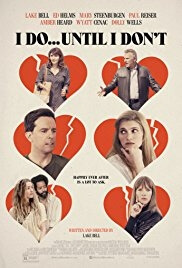Straw-man arguments interfere with the relationship comedy of Lake Bell’s I Do... Until I Don’t

One of the most lamely persistent tropes in modern romantic comedies—especially of the indie persuasion, and even more especially if they’re about characters of a certain middle-class means—is the character who boldly proclaims that marriage is an archaic, illogical, and/or meaningless institution. Almost any character who talks in such ham-fisted terms about the outdated bourgeois notion of lifelong commitment is either as insufferable and corny as they sound, or more often, a construct who exists to be disproved by the movie’s other made-up characters. It’s one of those debates that tends to interest filmmakers (especially of a certain middle-class-or-better means) more so than their audiences.
I Do… Until I Don’t very nearly makes this connection itself. Its doomsaying opponent of marriage is, for once, a filmmaker: Vivian (Dolly Wells), a documentarian whose previous effort, the acclaimed sociological study Tween Jungle, sounds hilariously plausible. Vivian is convinced that marriage is—get this—archaic and meaningless, and she proposes that it should be given a seven-year renewable contract, sort of like a long-term lease. Somehow, making a documentary following several married couples will prove her theory once and for all.
Even as a satirical conceit, Vivian’s ideas don’t make much sense; if marriage is so often the wrong choice, don’t relatively high divorce rates show a population already willing to self-correct? It’s not surprising, then, to see Vivian become a straw-woman character pretty early, prone to cartoonish villainy as she stacks the deck against marriage and hides behind provocations. It is surprising, though, to see these non-issues tackled by Lake Bell, the writer-director-performer behind In A World…, a movie so warmly charming that it’s frequently and inaccurately described as a romantic comedy.
World devoted mere minutes of screen time to a blossoming romantic relationship, while Bell’s follow-up is set almost entirely after the spark has gone out between two of its three main couples. Alice (Bell) and Noah (Ed Helms) are trying to get pregnant as they grapple with a failing family business, while Alice’s sister, Fanny (Amber Heard), and her partner, Zander (Wyatt Cenac), revel in an open relationship. The third and most contentious couple, Cybil (Mary Steenburgen) and Harvey (Paul Reiser), are only tied to the other two incidentally—and as subjects of Vivian’s listless documentary, which is apparently shot with a crew of two people and includes a lot of footage that zooms in stupidly close on its subjects’ hands or eyes as they sit on couches. (The movie also suggests that documentary subjects might reasonably negotiate for gross points; if it’s supposed to be a joke, it’s not a very good one.)
When she’s not playing fast and loose with the documentary form, Bell has a steady hand behind the camera. She’s good in front of it, too: Her Alice is breathy and blond, dresses almost exclusively in combinations of white and beige, needs to be told to speak up even when holding a microphone, and is prone to saying things like “oh dear”—a sharp pivot away from her headstrong In A World character, in other words. Bell’s mastery of character details and refusal to settle into a comic persona makes one wish she appeared in more movies. Although she gives the movie’s most engaging performance—Helms is stuck in tedious aw-shucks dork mode, while Steenburgen and Reiser have genuinely unpleasant exchanges like a slightly better-preserved version of the Lockhorns—she also provides some funny dialogue to the other characters, even if she insists on overlapping too much of it. (Sample marital grievance: “I listened to Widespread Panic for you!”)
The commitment the movie really fails to make is to its comedy. As I Do digs deeper into its characters’ relationship challenges, it repeatedly feints toward interlocking farce, before swiftly and timidly scurrying away, usually settling for the comfort of either maudlin sincerity or taking another kick at the straw documentarian. This softness seems to be rooted in Bell not wanting to jerk her characters around; her affection for them (minus Vivian) is clear in moments like a cute late-movie montage of couples canoodling to Heart’s “Alone.” But it’s the more farcical bits (again, minus Vivian) that play to her strengths as a filmmaker—she has the chops to make something more logistically ambitious than this good-natured dithering.
As much as the movie tries to tie itself in knots over contemporary romantic relationships, it’s happy to untangle itself with haste, and turns out to be pretty traditionalist about marriage (which makes its weird insistence on a home birth as a safe and optimal practice stick out even more). There’s nothing especially wrong with that, but if anything, the movie makes itself feel fustier by insisting on having an argument with a fictional idiot. The outline of a snappy relationship comedy is here, and Bell is talented enough to make one. Maybe next time she’ll commit to it.